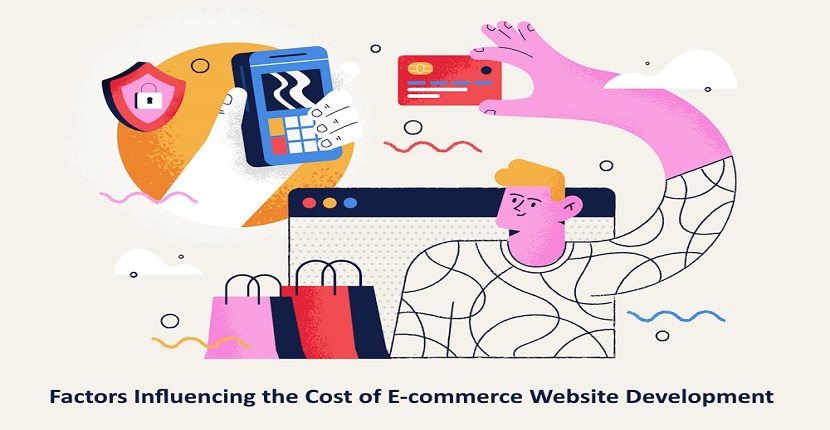E-commerce has significantly redefined how businesses operate in today’s digital age. The following article aims to decode the factors influencing the cost of e-commerce website development. Understanding these factors will help businesses make informed decisions and budget effectively for their e-commerce website development project.
Understanding E-commerce Website Development
E-commerce website development refers to the creation of a digital platform where businesses can sell their products or services online. In an era where digital presence is paramount, these platforms bridge the gap between businesses and consumers, facilitating seamless transactions. However, the complexity of designing and implementing such platforms comes at a cost.
Key Factors Influencing the Cost of E-commerce Website Development
-
Design Complexity
The complexity of the design directly impacts the cost. A simple layout with standard features is comparatively less costly than a complex, custom design. The more intricate your design, the more hours developers need to put in, leading to higher costs.
-
Functionality and Features
The functionality and features of an e-commerce website also contribute to its development cost. Advanced features such as live chat, product filters, customer reviews, and payment gateways require additional development time and resources, hence increasing the cost.
-
E-commerce Platform
The choice of the e-commerce platform significantly affects the overall cost. Established platforms like Magento, Shopify, or WooCommerce come with varying pricing structures. Your choice should align with your business needs and budget.
-
Security Measures
Robust security measures are vital to protect sensitive customer data. Implementing high-level security protocols like SSL certificates, two-factor authentication, and regular security audits can escalate the overall cost.
-
SEO and Marketing Features
Investing in SEO and marketing features can enhance your website’s visibility, driving more traffic and potential sales. These features may add an extra cost, but they are crucial for your website’s long-term success.
-
Maintenance and Updates
Maintaining and regularly updating your website is essential to ensure its smooth operation. These ongoing costs can include bug fixes, feature updates, hosting services, and backup services.
The Impact of Geography on Development Cost
The location of your development team can also influence the cost. Developers in different regions have varied hourly rates, mainly due to differences in living standards and market demand. Here are some key takeaways to consider when planning the budget for your ecommerce web development:
- Functionality and Features: Adding advanced features like live chat, customer reviews, and payment gateways can increase the cost due to the additional development time required.
- E-commerce Platform: Your choice of platform can significantly affect costs. Established platforms have different pricing structures; choose one that aligns with your business needs and budget.
- Security Measures: Robust security measures such as SSL certificates and two-factor authentication are crucial but may escalate the cost.
- SEO and Marketing Features: These features can enhance your website’s visibility and drive traffic, but they come with an additional cost.
- Maintenance and Updates: Don’t forget the ongoing costs of maintaining and updating your website. These can include bug fixes, feature updates, and hosting services.
- Geography: The location of your development team can influence the cost, with developers in different regions having varied hourly rates.
Choosing a Development Partner: Agency vs. Freelancer
Choosing between an agency and a freelancer has its own financial implications. While freelancers may offer lower rates, agencies often provide a team of experts who can deliver a more comprehensive and cohesive solution.
- Experience and Expertise: Agencies often house a diverse team skilled in various aspects of website development. This breadth of expertise can expedite the development process and enhance the quality of the final product.
- Reliability: Agencies typically have structured processes and backup resources, providing a higher level of reliability compared to freelancers.
- Project Management: With an agency, you often get dedicated project managers who keep the project on track and communicate updates, something not always available with freelancers.
- Post-Launch Support: Agencies usually offer ongoing support and maintenance services post-launch, ensuring your website continues to function optimally.
- All-In-One Solution: An agency can handle everything from design and development to SEO and marketing, making it a convenient one-stop solution.
Conclusion
Understanding the factors influencing Ecommerce Website Development Cost is crucial for making proper budgetary decisions. When it comes to developing an e-commerce platform, businesses should be mindful of these aspects to make an informed decision, optimally allocating their resources. The choice between a freelance developer and an agency will largely depend on your specific needs and budget. By closely scrutinizing these factors, businesses can select a development partner that not only meets their needs but also fits within their Ecommerce Website Development Cost expectations. Remember, it’s not just about finding the most affordable option; it’s about finding the right partner that can deliver a high-quality website within your budget. With diligent research and clear objectives, you can successfully traverse the world of Ecommerce Website Development Cost and take your online business to new heights.
